Comprehensive Report: Unit 6 Managing a Successful Business Project
VerifiedAdded on 2023/06/07
|30
|6519
|270
Report
AI Summary
This report focuses on managing a successful business project, specifically the implementation of artificial intelligence in the operations of The Bude Hideaways, a hospitality sector company. The project aims to improve service quality, increase customer bookings, and enhance profitability through AI. The report covers project planning, including defining objectives, deliverables, project scope, stakeholder analysis, and methodologies such as agile. It includes a budget formulation, work breakdown structure (WBS), time scale, risk management register, quality management, and communication plan. Primary and secondary research are conducted to analyze digital transformation and innovative digital tools. The report also includes data analysis and reflective practice, concluding with key findings and recommendations. Desklib provides access to similar solved assignments and study resources for students.
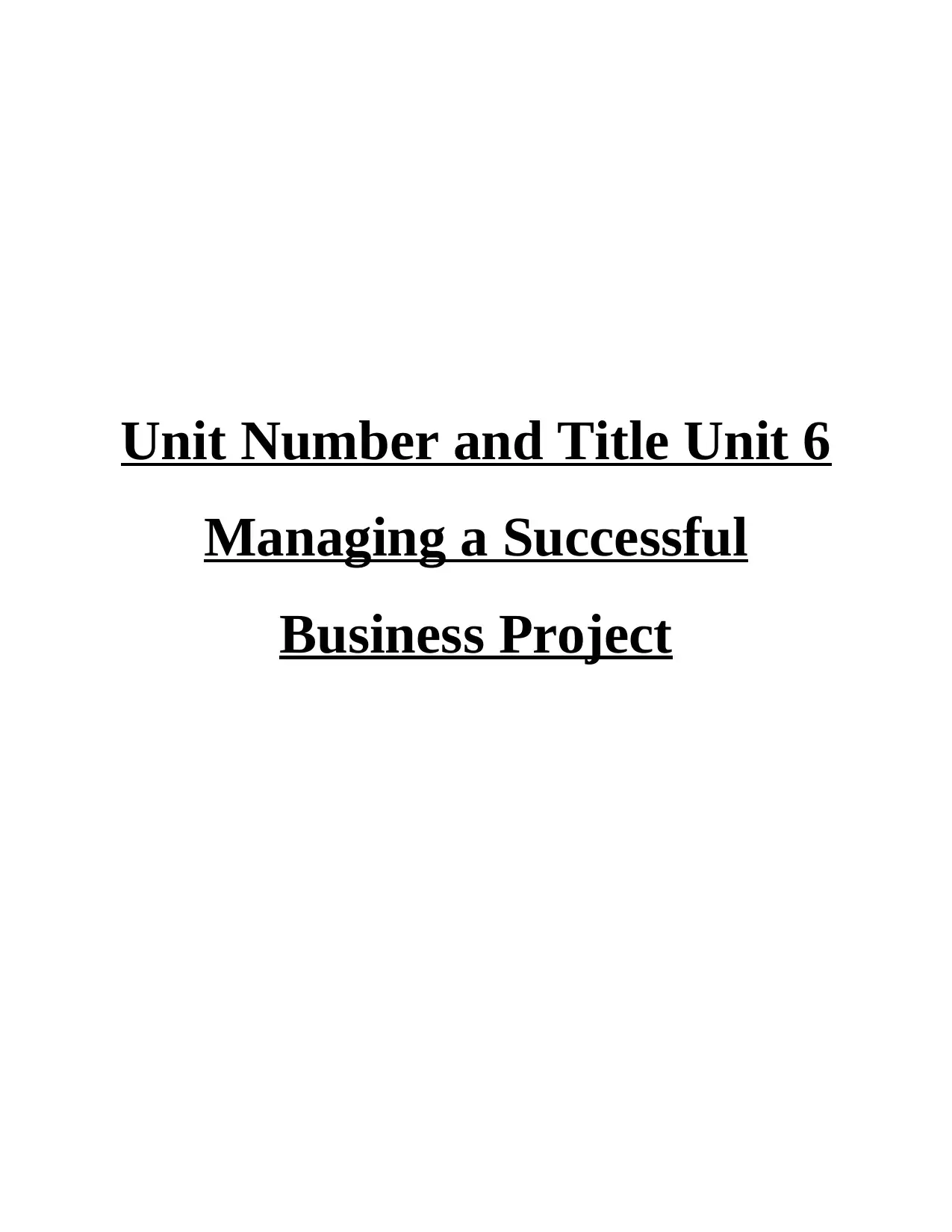
Unit Number and Title Unit 6
Managing a Successful
Business Project
Managing a Successful
Business Project
Paraphrase This Document
Need a fresh take? Get an instant paraphrase of this document with our AI Paraphraser
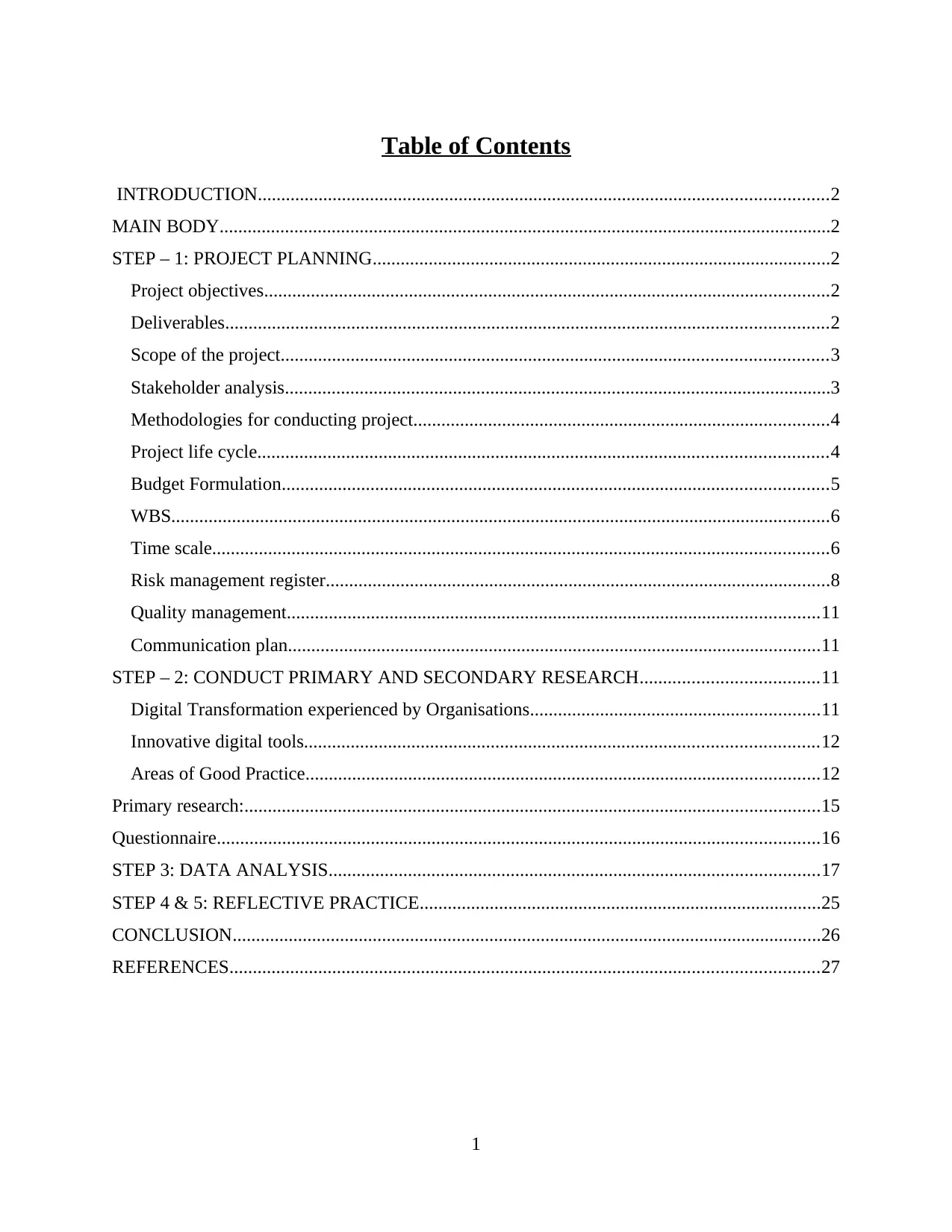
Table of Contents
INTRODUCTION..........................................................................................................................2
MAIN BODY...................................................................................................................................2
STEP – 1: PROJECT PLANNING..................................................................................................2
Project objectives.........................................................................................................................2
Deliverables.................................................................................................................................2
Scope of the project.....................................................................................................................3
Stakeholder analysis.....................................................................................................................3
Methodologies for conducting project.........................................................................................4
Project life cycle..........................................................................................................................4
Budget Formulation.....................................................................................................................5
WBS.............................................................................................................................................6
Time scale....................................................................................................................................6
Risk management register............................................................................................................8
Quality management..................................................................................................................11
Communication plan..................................................................................................................11
STEP – 2: CONDUCT PRIMARY AND SECONDARY RESEARCH......................................11
Digital Transformation experienced by Organisations..............................................................11
Innovative digital tools..............................................................................................................12
Areas of Good Practice..............................................................................................................12
Primary research:...........................................................................................................................15
Questionnaire.................................................................................................................................16
STEP 3: DATA ANALYSIS.........................................................................................................17
STEP 4 & 5: REFLECTIVE PRACTICE......................................................................................25
CONCLUSION..............................................................................................................................26
REFERENCES..............................................................................................................................27
1
INTRODUCTION..........................................................................................................................2
MAIN BODY...................................................................................................................................2
STEP – 1: PROJECT PLANNING..................................................................................................2
Project objectives.........................................................................................................................2
Deliverables.................................................................................................................................2
Scope of the project.....................................................................................................................3
Stakeholder analysis.....................................................................................................................3
Methodologies for conducting project.........................................................................................4
Project life cycle..........................................................................................................................4
Budget Formulation.....................................................................................................................5
WBS.............................................................................................................................................6
Time scale....................................................................................................................................6
Risk management register............................................................................................................8
Quality management..................................................................................................................11
Communication plan..................................................................................................................11
STEP – 2: CONDUCT PRIMARY AND SECONDARY RESEARCH......................................11
Digital Transformation experienced by Organisations..............................................................11
Innovative digital tools..............................................................................................................12
Areas of Good Practice..............................................................................................................12
Primary research:...........................................................................................................................15
Questionnaire.................................................................................................................................16
STEP 3: DATA ANALYSIS.........................................................................................................17
STEP 4 & 5: REFLECTIVE PRACTICE......................................................................................25
CONCLUSION..............................................................................................................................26
REFERENCES..............................................................................................................................27
1
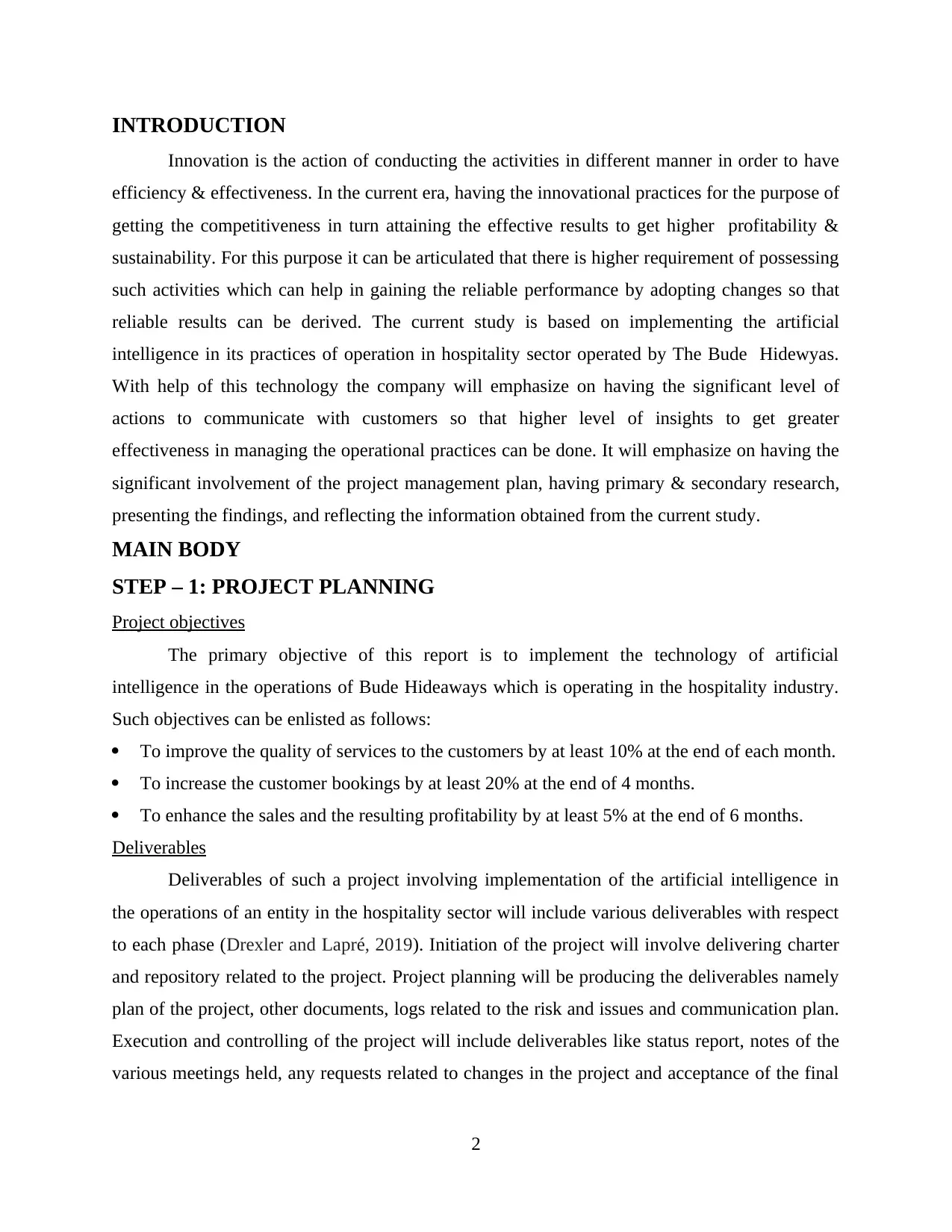
INTRODUCTION
Innovation is the action of conducting the activities in different manner in order to have
efficiency & effectiveness. In the current era, having the innovational practices for the purpose of
getting the competitiveness in turn attaining the effective results to get higher profitability &
sustainability. For this purpose it can be articulated that there is higher requirement of possessing
such activities which can help in gaining the reliable performance by adopting changes so that
reliable results can be derived. The current study is based on implementing the artificial
intelligence in its practices of operation in hospitality sector operated by The Bude Hidewyas.
With help of this technology the company will emphasize on having the significant level of
actions to communicate with customers so that higher level of insights to get greater
effectiveness in managing the operational practices can be done. It will emphasize on having the
significant involvement of the project management plan, having primary & secondary research,
presenting the findings, and reflecting the information obtained from the current study.
MAIN BODY
STEP – 1: PROJECT PLANNING
Project objectives
The primary objective of this report is to implement the technology of artificial
intelligence in the operations of Bude Hideaways which is operating in the hospitality industry.
Such objectives can be enlisted as follows:
To improve the quality of services to the customers by at least 10% at the end of each month.
To increase the customer bookings by at least 20% at the end of 4 months.
To enhance the sales and the resulting profitability by at least 5% at the end of 6 months.
Deliverables
Deliverables of such a project involving implementation of the artificial intelligence in
the operations of an entity in the hospitality sector will include various deliverables with respect
to each phase (Drexler and Lapré, 2019). Initiation of the project will involve delivering charter
and repository related to the project. Project planning will be producing the deliverables namely
plan of the project, other documents, logs related to the risk and issues and communication plan.
Execution and controlling of the project will include deliverables like status report, notes of the
various meetings held, any requests related to changes in the project and acceptance of the final
2
Innovation is the action of conducting the activities in different manner in order to have
efficiency & effectiveness. In the current era, having the innovational practices for the purpose of
getting the competitiveness in turn attaining the effective results to get higher profitability &
sustainability. For this purpose it can be articulated that there is higher requirement of possessing
such activities which can help in gaining the reliable performance by adopting changes so that
reliable results can be derived. The current study is based on implementing the artificial
intelligence in its practices of operation in hospitality sector operated by The Bude Hidewyas.
With help of this technology the company will emphasize on having the significant level of
actions to communicate with customers so that higher level of insights to get greater
effectiveness in managing the operational practices can be done. It will emphasize on having the
significant involvement of the project management plan, having primary & secondary research,
presenting the findings, and reflecting the information obtained from the current study.
MAIN BODY
STEP – 1: PROJECT PLANNING
Project objectives
The primary objective of this report is to implement the technology of artificial
intelligence in the operations of Bude Hideaways which is operating in the hospitality industry.
Such objectives can be enlisted as follows:
To improve the quality of services to the customers by at least 10% at the end of each month.
To increase the customer bookings by at least 20% at the end of 4 months.
To enhance the sales and the resulting profitability by at least 5% at the end of 6 months.
Deliverables
Deliverables of such a project involving implementation of the artificial intelligence in
the operations of an entity in the hospitality sector will include various deliverables with respect
to each phase (Drexler and Lapré, 2019). Initiation of the project will involve delivering charter
and repository related to the project. Project planning will be producing the deliverables namely
plan of the project, other documents, logs related to the risk and issues and communication plan.
Execution and controlling of the project will include deliverables like status report, notes of the
various meetings held, any requests related to changes in the project and acceptance of the final
2
⊘ This is a preview!⊘
Do you want full access?
Subscribe today to unlock all pages.

Trusted by 1+ million students worldwide
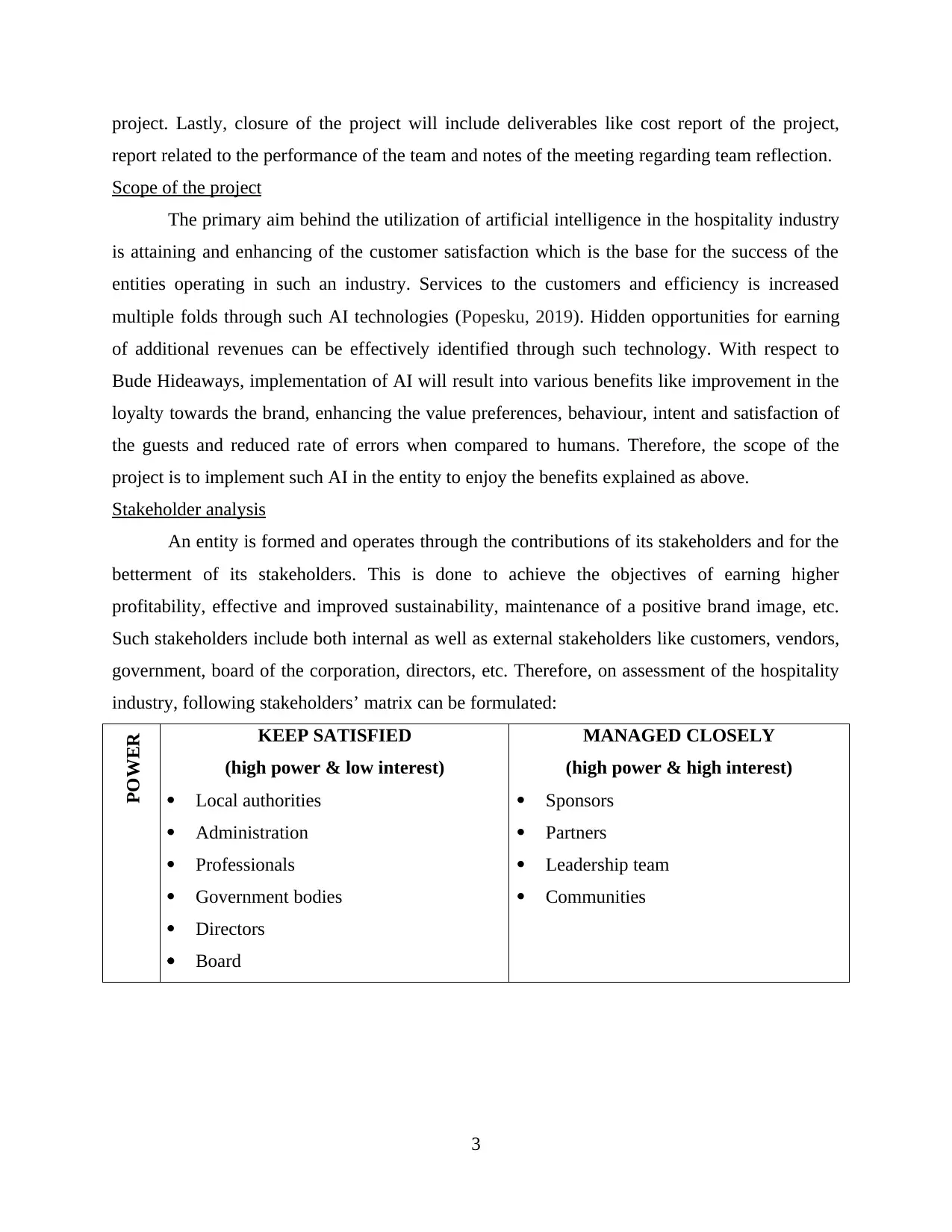
project. Lastly, closure of the project will include deliverables like cost report of the project,
report related to the performance of the team and notes of the meeting regarding team reflection.
Scope of the project
The primary aim behind the utilization of artificial intelligence in the hospitality industry
is attaining and enhancing of the customer satisfaction which is the base for the success of the
entities operating in such an industry. Services to the customers and efficiency is increased
multiple folds through such AI technologies (Popesku, 2019). Hidden opportunities for earning
of additional revenues can be effectively identified through such technology. With respect to
Bude Hideaways, implementation of AI will result into various benefits like improvement in the
loyalty towards the brand, enhancing the value preferences, behaviour, intent and satisfaction of
the guests and reduced rate of errors when compared to humans. Therefore, the scope of the
project is to implement such AI in the entity to enjoy the benefits explained as above.
Stakeholder analysis
An entity is formed and operates through the contributions of its stakeholders and for the
betterment of its stakeholders. This is done to achieve the objectives of earning higher
profitability, effective and improved sustainability, maintenance of a positive brand image, etc.
Such stakeholders include both internal as well as external stakeholders like customers, vendors,
government, board of the corporation, directors, etc. Therefore, on assessment of the hospitality
industry, following stakeholders’ matrix can be formulated:
POWER KEEP SATISFIED
(high power & low interest)
Local authorities
Administration
Professionals
Government bodies
Directors
Board
MANAGED CLOSELY
(high power & high interest)
Sponsors
Partners
Leadership team
Communities
3
report related to the performance of the team and notes of the meeting regarding team reflection.
Scope of the project
The primary aim behind the utilization of artificial intelligence in the hospitality industry
is attaining and enhancing of the customer satisfaction which is the base for the success of the
entities operating in such an industry. Services to the customers and efficiency is increased
multiple folds through such AI technologies (Popesku, 2019). Hidden opportunities for earning
of additional revenues can be effectively identified through such technology. With respect to
Bude Hideaways, implementation of AI will result into various benefits like improvement in the
loyalty towards the brand, enhancing the value preferences, behaviour, intent and satisfaction of
the guests and reduced rate of errors when compared to humans. Therefore, the scope of the
project is to implement such AI in the entity to enjoy the benefits explained as above.
Stakeholder analysis
An entity is formed and operates through the contributions of its stakeholders and for the
betterment of its stakeholders. This is done to achieve the objectives of earning higher
profitability, effective and improved sustainability, maintenance of a positive brand image, etc.
Such stakeholders include both internal as well as external stakeholders like customers, vendors,
government, board of the corporation, directors, etc. Therefore, on assessment of the hospitality
industry, following stakeholders’ matrix can be formulated:
POWER KEEP SATISFIED
(high power & low interest)
Local authorities
Administration
Professionals
Government bodies
Directors
Board
MANAGED CLOSELY
(high power & high interest)
Sponsors
Partners
Leadership team
Communities
3
Paraphrase This Document
Need a fresh take? Get an instant paraphrase of this document with our AI Paraphraser
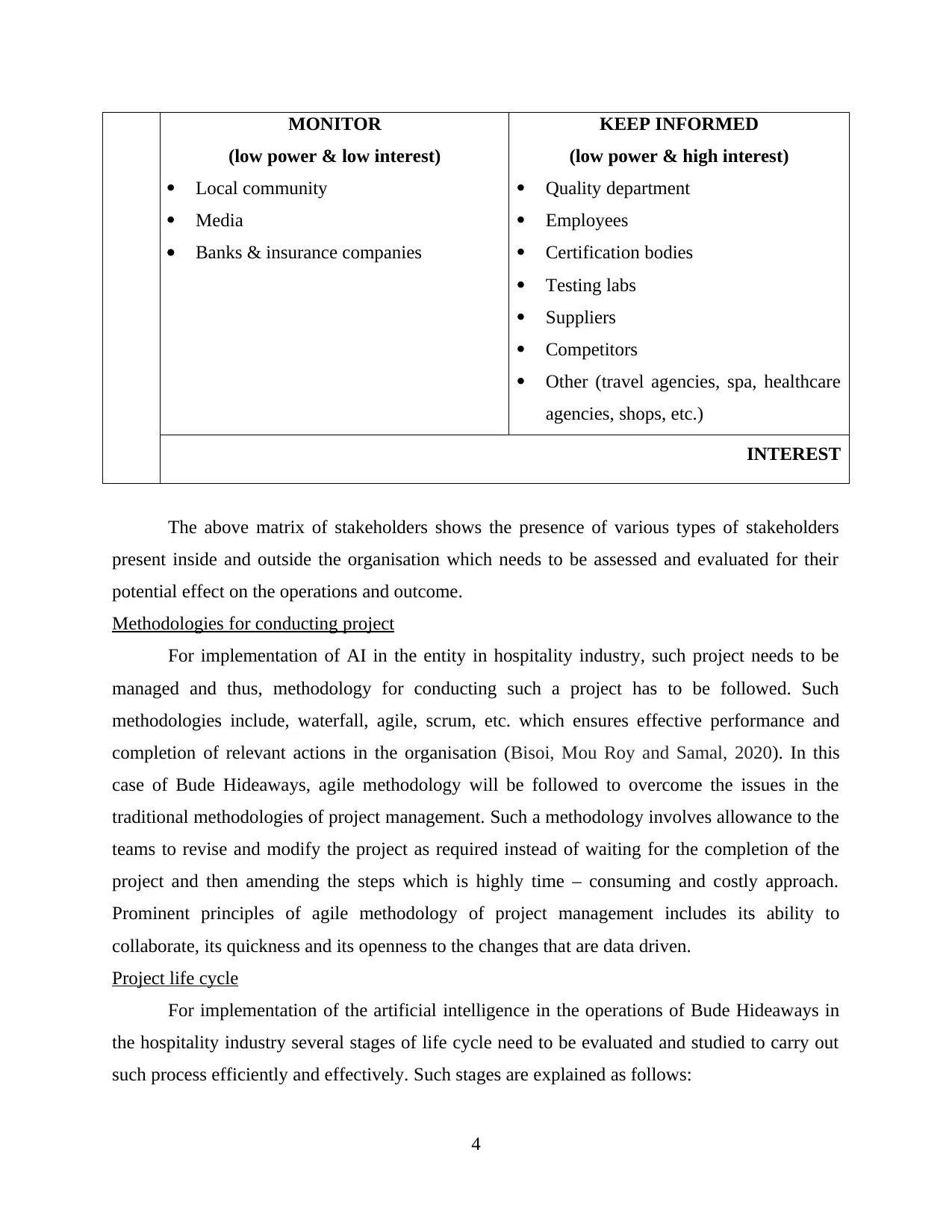
MONITOR
(low power & low interest)
Local community
Media
Banks & insurance companies
KEEP INFORMED
(low power & high interest)
Quality department
Employees
Certification bodies
Testing labs
Suppliers
Competitors
Other (travel agencies, spa, healthcare
agencies, shops, etc.)
INTEREST
The above matrix of stakeholders shows the presence of various types of stakeholders
present inside and outside the organisation which needs to be assessed and evaluated for their
potential effect on the operations and outcome.
Methodologies for conducting project
For implementation of AI in the entity in hospitality industry, such project needs to be
managed and thus, methodology for conducting such a project has to be followed. Such
methodologies include, waterfall, agile, scrum, etc. which ensures effective performance and
completion of relevant actions in the organisation (Bisoi, Mou Roy and Samal, 2020). In this
case of Bude Hideaways, agile methodology will be followed to overcome the issues in the
traditional methodologies of project management. Such a methodology involves allowance to the
teams to revise and modify the project as required instead of waiting for the completion of the
project and then amending the steps which is highly time – consuming and costly approach.
Prominent principles of agile methodology of project management includes its ability to
collaborate, its quickness and its openness to the changes that are data driven.
Project life cycle
For implementation of the artificial intelligence in the operations of Bude Hideaways in
the hospitality industry several stages of life cycle need to be evaluated and studied to carry out
such process efficiently and effectively. Such stages are explained as follows:
4
(low power & low interest)
Local community
Media
Banks & insurance companies
KEEP INFORMED
(low power & high interest)
Quality department
Employees
Certification bodies
Testing labs
Suppliers
Competitors
Other (travel agencies, spa, healthcare
agencies, shops, etc.)
INTEREST
The above matrix of stakeholders shows the presence of various types of stakeholders
present inside and outside the organisation which needs to be assessed and evaluated for their
potential effect on the operations and outcome.
Methodologies for conducting project
For implementation of AI in the entity in hospitality industry, such project needs to be
managed and thus, methodology for conducting such a project has to be followed. Such
methodologies include, waterfall, agile, scrum, etc. which ensures effective performance and
completion of relevant actions in the organisation (Bisoi, Mou Roy and Samal, 2020). In this
case of Bude Hideaways, agile methodology will be followed to overcome the issues in the
traditional methodologies of project management. Such a methodology involves allowance to the
teams to revise and modify the project as required instead of waiting for the completion of the
project and then amending the steps which is highly time – consuming and costly approach.
Prominent principles of agile methodology of project management includes its ability to
collaborate, its quickness and its openness to the changes that are data driven.
Project life cycle
For implementation of the artificial intelligence in the operations of Bude Hideaways in
the hospitality industry several stages of life cycle need to be evaluated and studied to carry out
such process efficiently and effectively. Such stages are explained as follows:
4
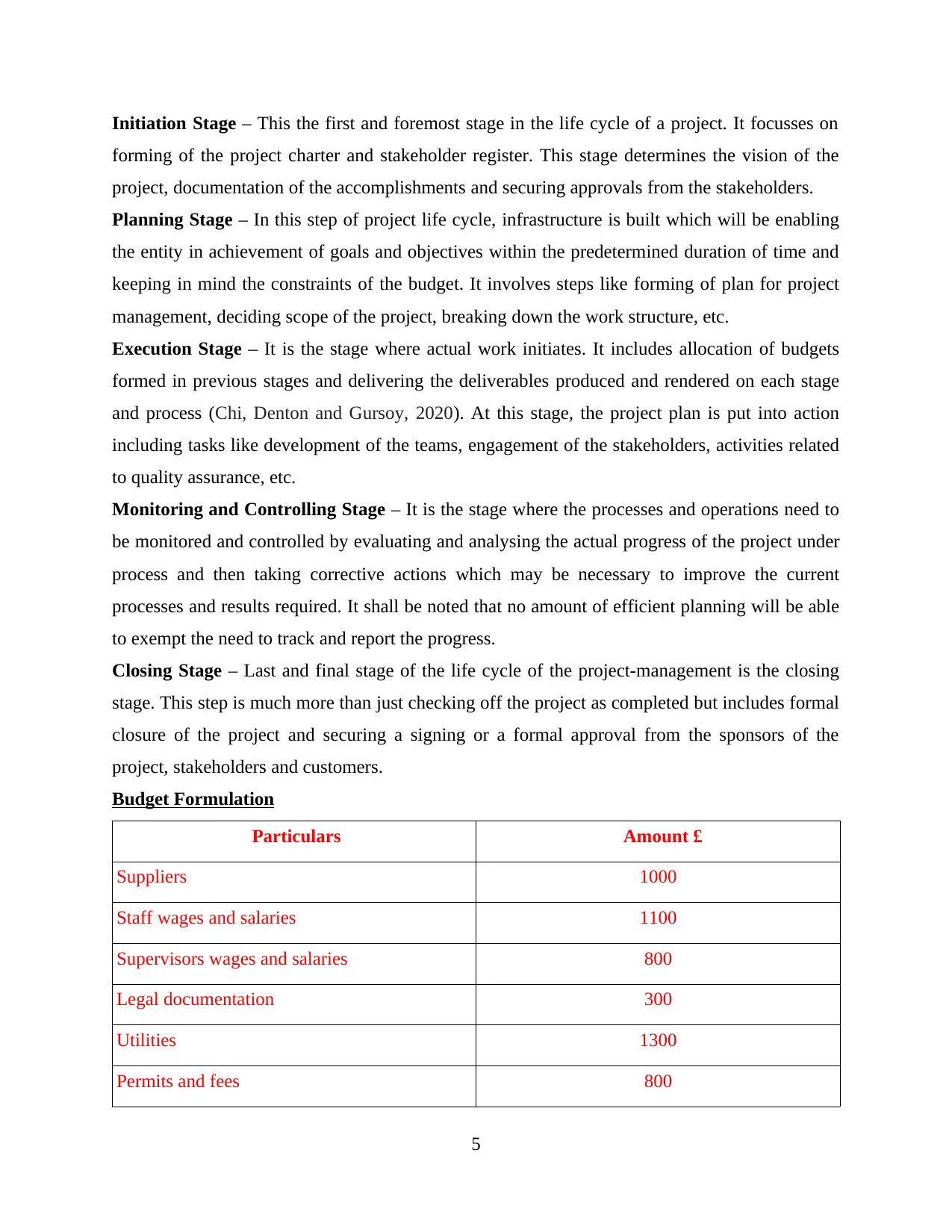
Initiation Stage – This the first and foremost stage in the life cycle of a project. It focusses on
forming of the project charter and stakeholder register. This stage determines the vision of the
project, documentation of the accomplishments and securing approvals from the stakeholders.
Planning Stage – In this step of project life cycle, infrastructure is built which will be enabling
the entity in achievement of goals and objectives within the predetermined duration of time and
keeping in mind the constraints of the budget. It involves steps like forming of plan for project
management, deciding scope of the project, breaking down the work structure, etc.
Execution Stage – It is the stage where actual work initiates. It includes allocation of budgets
formed in previous stages and delivering the deliverables produced and rendered on each stage
and process (Chi, Denton and Gursoy, 2020). At this stage, the project plan is put into action
including tasks like development of the teams, engagement of the stakeholders, activities related
to quality assurance, etc.
Monitoring and Controlling Stage – It is the stage where the processes and operations need to
be monitored and controlled by evaluating and analysing the actual progress of the project under
process and then taking corrective actions which may be necessary to improve the current
processes and results required. It shall be noted that no amount of efficient planning will be able
to exempt the need to track and report the progress.
Closing Stage – Last and final stage of the life cycle of the project-management is the closing
stage. This step is much more than just checking off the project as completed but includes formal
closure of the project and securing a signing or a formal approval from the sponsors of the
project, stakeholders and customers.
Budget Formulation
Particulars Amount £
Suppliers 1000
Staff wages and salaries 1100
Supervisors wages and salaries 800
Legal documentation 300
Utilities 1300
Permits and fees 800
5
forming of the project charter and stakeholder register. This stage determines the vision of the
project, documentation of the accomplishments and securing approvals from the stakeholders.
Planning Stage – In this step of project life cycle, infrastructure is built which will be enabling
the entity in achievement of goals and objectives within the predetermined duration of time and
keeping in mind the constraints of the budget. It involves steps like forming of plan for project
management, deciding scope of the project, breaking down the work structure, etc.
Execution Stage – It is the stage where actual work initiates. It includes allocation of budgets
formed in previous stages and delivering the deliverables produced and rendered on each stage
and process (Chi, Denton and Gursoy, 2020). At this stage, the project plan is put into action
including tasks like development of the teams, engagement of the stakeholders, activities related
to quality assurance, etc.
Monitoring and Controlling Stage – It is the stage where the processes and operations need to
be monitored and controlled by evaluating and analysing the actual progress of the project under
process and then taking corrective actions which may be necessary to improve the current
processes and results required. It shall be noted that no amount of efficient planning will be able
to exempt the need to track and report the progress.
Closing Stage – Last and final stage of the life cycle of the project-management is the closing
stage. This step is much more than just checking off the project as completed but includes formal
closure of the project and securing a signing or a formal approval from the sponsors of the
project, stakeholders and customers.
Budget Formulation
Particulars Amount £
Suppliers 1000
Staff wages and salaries 1100
Supervisors wages and salaries 800
Legal documentation 300
Utilities 1300
Permits and fees 800
5
⊘ This is a preview!⊘
Do you want full access?
Subscribe today to unlock all pages.

Trusted by 1+ million students worldwide
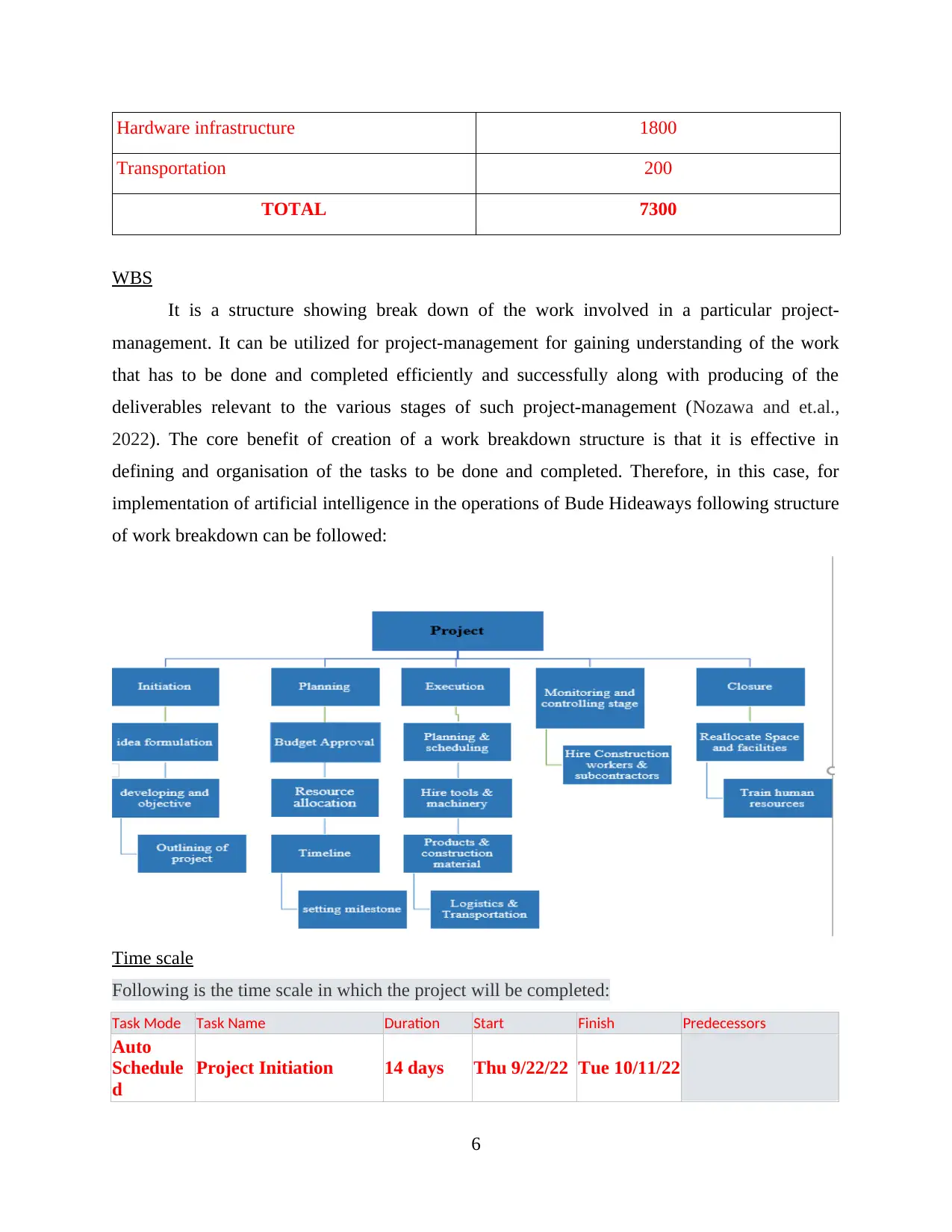
Hardware infrastructure 1800
Transportation 200
TOTAL 7300
WBS
It is a structure showing break down of the work involved in a particular project-
management. It can be utilized for project-management for gaining understanding of the work
that has to be done and completed efficiently and successfully along with producing of the
deliverables relevant to the various stages of such project-management (Nozawa and et.al.,
2022). The core benefit of creation of a work breakdown structure is that it is effective in
defining and organisation of the tasks to be done and completed. Therefore, in this case, for
implementation of artificial intelligence in the operations of Bude Hideaways following structure
of work breakdown can be followed:
Time scale
Following is the time scale in which the project will be completed:
Task Mode Task Name Duration Start Finish Predecessors
Auto
Schedule
d
Project Initiation 14 days Thu 9/22/22 Tue 10/11/22
6
Transportation 200
TOTAL 7300
WBS
It is a structure showing break down of the work involved in a particular project-
management. It can be utilized for project-management for gaining understanding of the work
that has to be done and completed efficiently and successfully along with producing of the
deliverables relevant to the various stages of such project-management (Nozawa and et.al.,
2022). The core benefit of creation of a work breakdown structure is that it is effective in
defining and organisation of the tasks to be done and completed. Therefore, in this case, for
implementation of artificial intelligence in the operations of Bude Hideaways following structure
of work breakdown can be followed:
Time scale
Following is the time scale in which the project will be completed:
Task Mode Task Name Duration Start Finish Predecessors
Auto
Schedule
d
Project Initiation 14 days Thu 9/22/22 Tue 10/11/22
6
Paraphrase This Document
Need a fresh take? Get an instant paraphrase of this document with our AI Paraphraser
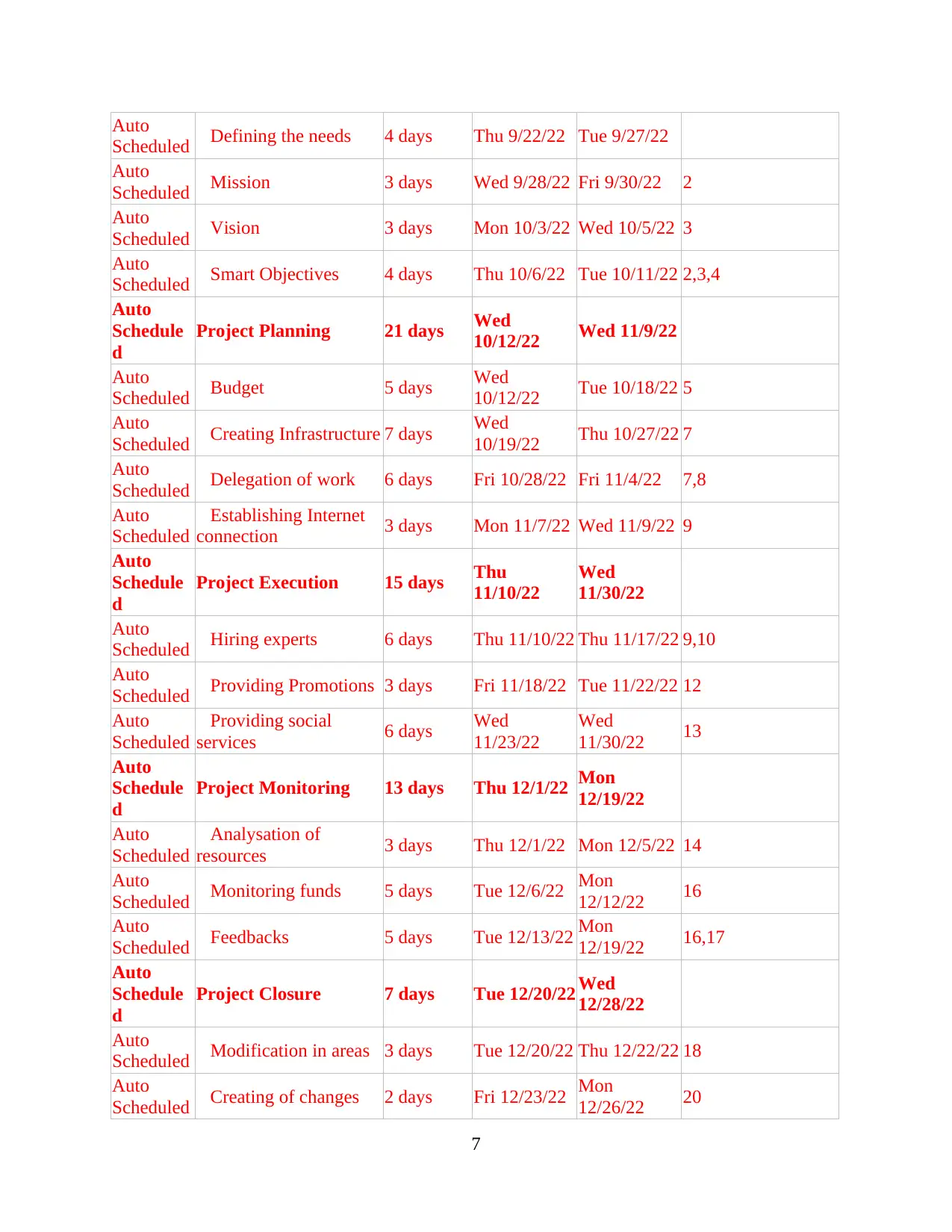
Auto
Scheduled Defining the needs 4 days Thu 9/22/22 Tue 9/27/22
Auto
Scheduled Mission 3 days Wed 9/28/22 Fri 9/30/22 2
Auto
Scheduled Vision 3 days Mon 10/3/22 Wed 10/5/22 3
Auto
Scheduled Smart Objectives 4 days Thu 10/6/22 Tue 10/11/22 2,3,4
Auto
Schedule
d
Project Planning 21 days Wed
10/12/22 Wed 11/9/22
Auto
Scheduled Budget 5 days Wed
10/12/22 Tue 10/18/22 5
Auto
Scheduled Creating Infrastructure 7 days Wed
10/19/22 Thu 10/27/22 7
Auto
Scheduled Delegation of work 6 days Fri 10/28/22 Fri 11/4/22 7,8
Auto
Scheduled
Establishing Internet
connection 3 days Mon 11/7/22 Wed 11/9/22 9
Auto
Schedule
d
Project Execution 15 days Thu
11/10/22
Wed
11/30/22
Auto
Scheduled Hiring experts 6 days Thu 11/10/22 Thu 11/17/22 9,10
Auto
Scheduled Providing Promotions 3 days Fri 11/18/22 Tue 11/22/22 12
Auto
Scheduled
Providing social
services 6 days Wed
11/23/22
Wed
11/30/22 13
Auto
Schedule
d
Project Monitoring 13 days Thu 12/1/22 Mon
12/19/22
Auto
Scheduled
Analysation of
resources 3 days Thu 12/1/22 Mon 12/5/22 14
Auto
Scheduled Monitoring funds 5 days Tue 12/6/22 Mon
12/12/22 16
Auto
Scheduled Feedbacks 5 days Tue 12/13/22 Mon
12/19/22 16,17
Auto
Schedule
d
Project Closure 7 days Tue 12/20/22 Wed
12/28/22
Auto
Scheduled Modification in areas 3 days Tue 12/20/22 Thu 12/22/22 18
Auto
Scheduled Creating of changes 2 days Fri 12/23/22 Mon
12/26/22 20
7
Scheduled Defining the needs 4 days Thu 9/22/22 Tue 9/27/22
Auto
Scheduled Mission 3 days Wed 9/28/22 Fri 9/30/22 2
Auto
Scheduled Vision 3 days Mon 10/3/22 Wed 10/5/22 3
Auto
Scheduled Smart Objectives 4 days Thu 10/6/22 Tue 10/11/22 2,3,4
Auto
Schedule
d
Project Planning 21 days Wed
10/12/22 Wed 11/9/22
Auto
Scheduled Budget 5 days Wed
10/12/22 Tue 10/18/22 5
Auto
Scheduled Creating Infrastructure 7 days Wed
10/19/22 Thu 10/27/22 7
Auto
Scheduled Delegation of work 6 days Fri 10/28/22 Fri 11/4/22 7,8
Auto
Scheduled
Establishing Internet
connection 3 days Mon 11/7/22 Wed 11/9/22 9
Auto
Schedule
d
Project Execution 15 days Thu
11/10/22
Wed
11/30/22
Auto
Scheduled Hiring experts 6 days Thu 11/10/22 Thu 11/17/22 9,10
Auto
Scheduled Providing Promotions 3 days Fri 11/18/22 Tue 11/22/22 12
Auto
Scheduled
Providing social
services 6 days Wed
11/23/22
Wed
11/30/22 13
Auto
Schedule
d
Project Monitoring 13 days Thu 12/1/22 Mon
12/19/22
Auto
Scheduled
Analysation of
resources 3 days Thu 12/1/22 Mon 12/5/22 14
Auto
Scheduled Monitoring funds 5 days Tue 12/6/22 Mon
12/12/22 16
Auto
Scheduled Feedbacks 5 days Tue 12/13/22 Mon
12/19/22 16,17
Auto
Schedule
d
Project Closure 7 days Tue 12/20/22 Wed
12/28/22
Auto
Scheduled Modification in areas 3 days Tue 12/20/22 Thu 12/22/22 18
Auto
Scheduled Creating of changes 2 days Fri 12/23/22 Mon
12/26/22 20
7
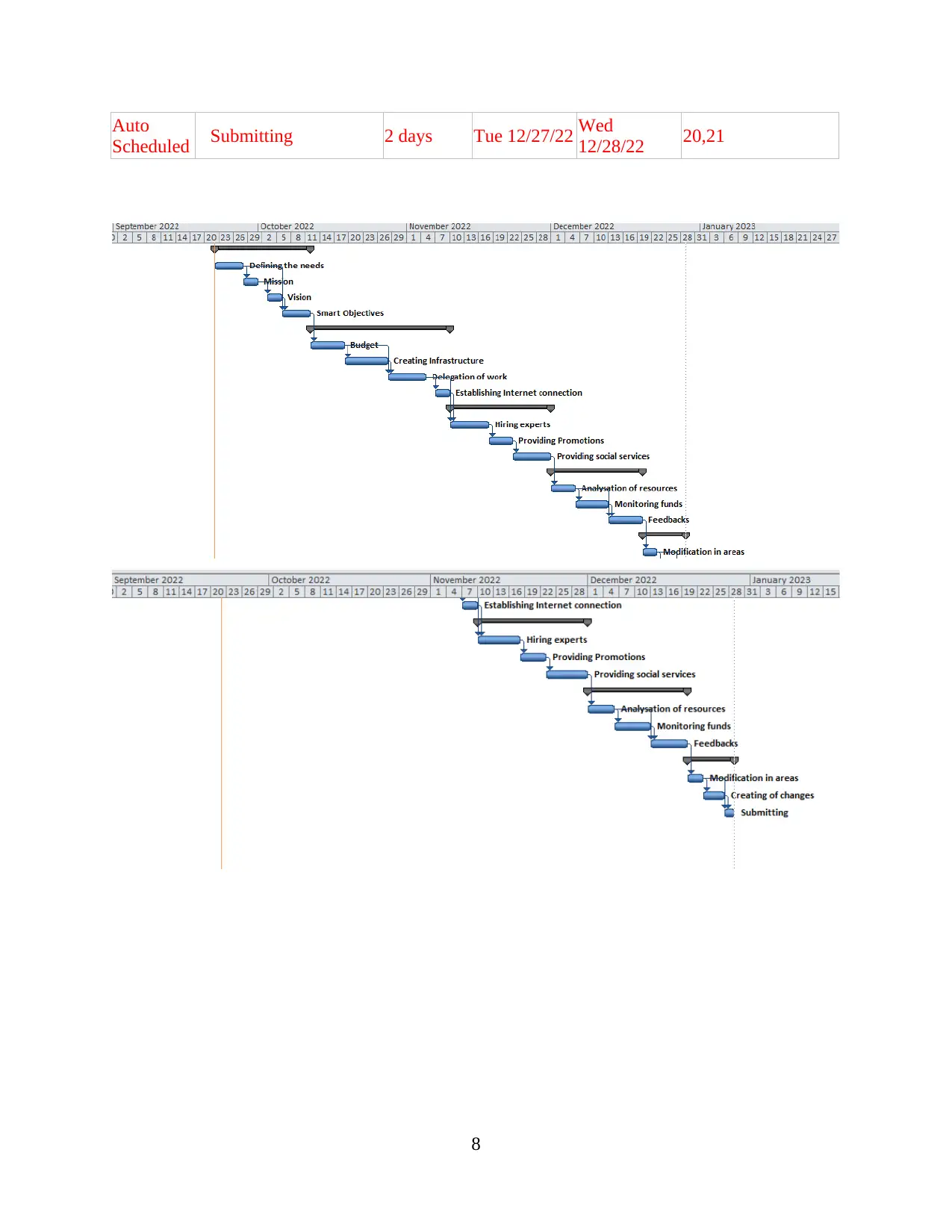
Auto
Scheduled Submitting 2 days Tue 12/27/22 Wed
12/28/22 20,21
8
Scheduled Submitting 2 days Tue 12/27/22 Wed
12/28/22 20,21
8
⊘ This is a preview!⊘
Do you want full access?
Subscribe today to unlock all pages.

Trusted by 1+ million students worldwide
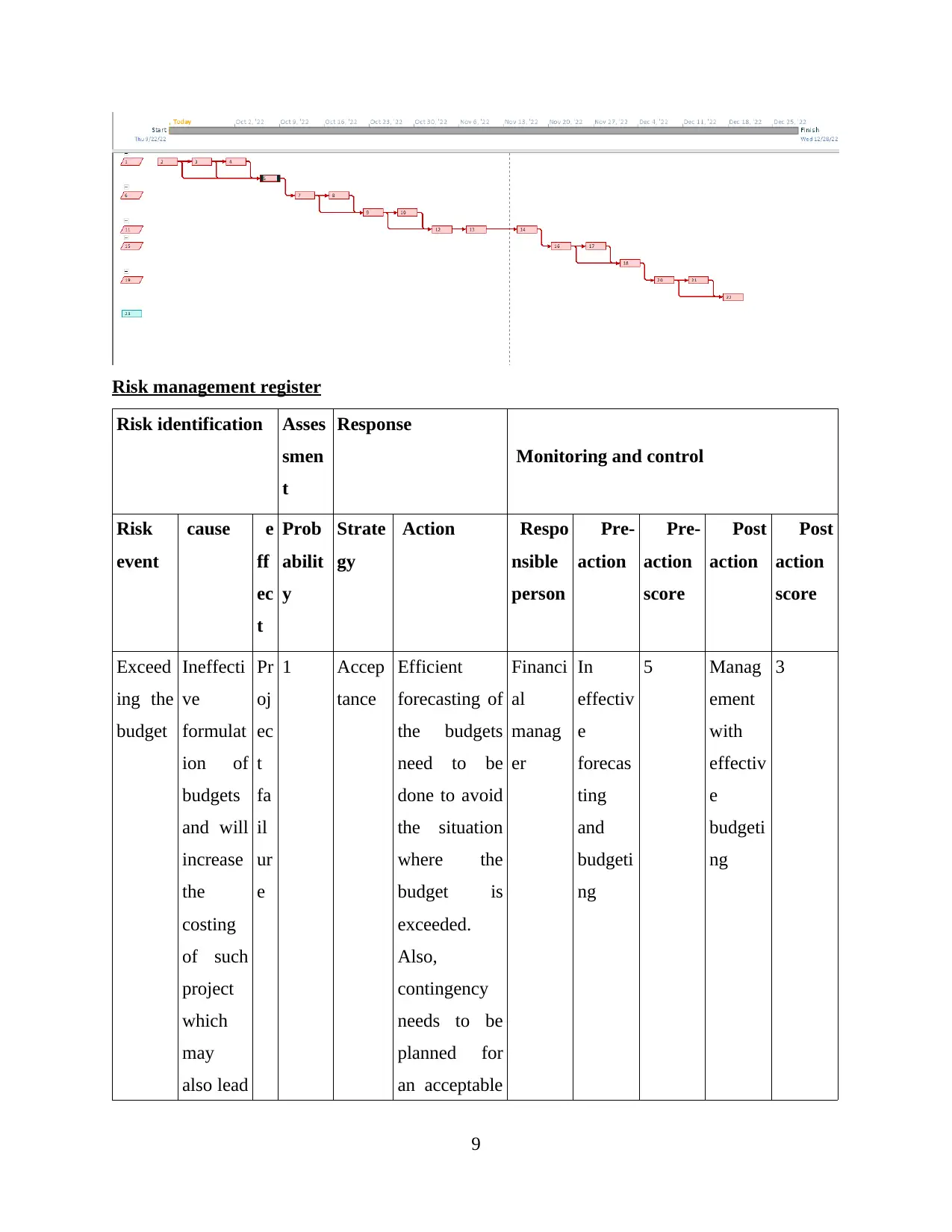
Risk management register
Risk identification Asses
smen
t
Response
Monitoring and control
Risk
event
cause e
ff
ec
t
Prob
abilit
y
Strate
gy
Action Respo
nsible
person
Pre-
action
Pre-
action
score
Post
action
Post
action
score
Exceed
ing the
budget
Ineffecti
ve
formulat
ion of
budgets
and will
increase
the
costing
of such
project
which
may
also lead
Pr
oj
ec
t
fa
il
ur
e
1 Accep
tance
Efficient
forecasting of
the budgets
need to be
done to avoid
the situation
where the
budget is
exceeded.
Also,
contingency
needs to be
planned for
an acceptable
Financi
al
manag
er
In
effectiv
e
forecas
ting
and
budgeti
ng
5 Manag
ement
with
effectiv
e
budgeti
ng
3
9
Risk identification Asses
smen
t
Response
Monitoring and control
Risk
event
cause e
ff
ec
t
Prob
abilit
y
Strate
gy
Action Respo
nsible
person
Pre-
action
Pre-
action
score
Post
action
Post
action
score
Exceed
ing the
budget
Ineffecti
ve
formulat
ion of
budgets
and will
increase
the
costing
of such
project
which
may
also lead
Pr
oj
ec
t
fa
il
ur
e
1 Accep
tance
Efficient
forecasting of
the budgets
need to be
done to avoid
the situation
where the
budget is
exceeded.
Also,
contingency
needs to be
planned for
an acceptable
Financi
al
manag
er
In
effectiv
e
forecas
ting
and
budgeti
ng
5 Manag
ement
with
effectiv
e
budgeti
ng
3
9
Paraphrase This Document
Need a fresh take? Get an instant paraphrase of this document with our AI Paraphraser
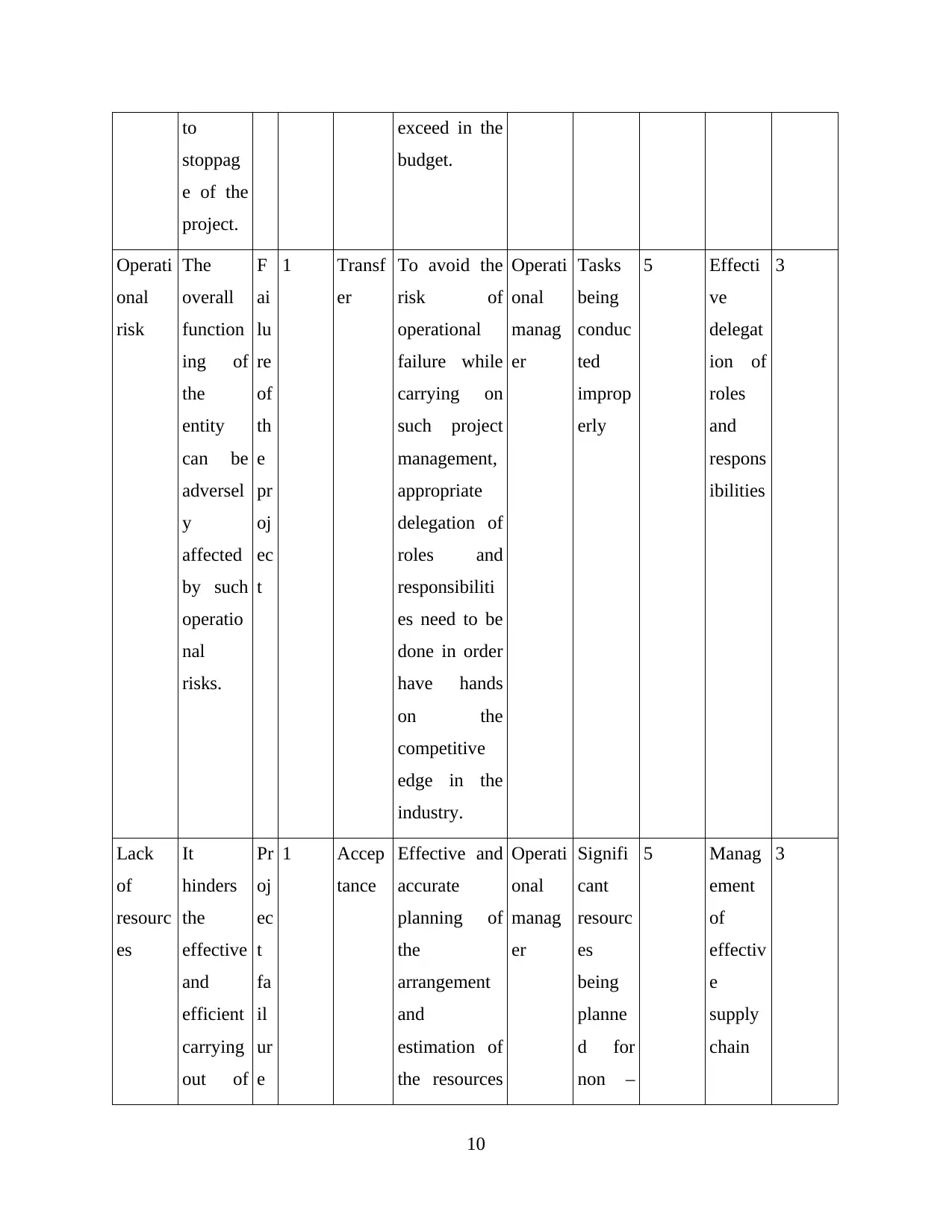
to
stoppag
e of the
project.
exceed in the
budget.
Operati
onal
risk
The
overall
function
ing of
the
entity
can be
adversel
y
affected
by such
operatio
nal
risks.
F
ai
lu
re
of
th
e
pr
oj
ec
t
1 Transf
er
To avoid the
risk of
operational
failure while
carrying on
such project
management,
appropriate
delegation of
roles and
responsibiliti
es need to be
done in order
have hands
on the
competitive
edge in the
industry.
Operati
onal
manag
er
Tasks
being
conduc
ted
improp
erly
5 Effecti
ve
delegat
ion of
roles
and
respons
ibilities
3
Lack
of
resourc
es
It
hinders
the
effective
and
efficient
carrying
out of
Pr
oj
ec
t
fa
il
ur
e
1 Accep
tance
Effective and
accurate
planning of
the
arrangement
and
estimation of
the resources
Operati
onal
manag
er
Signifi
cant
resourc
es
being
planne
d for
non –
5 Manag
ement
of
effectiv
e
supply
chain
3
10
stoppag
e of the
project.
exceed in the
budget.
Operati
onal
risk
The
overall
function
ing of
the
entity
can be
adversel
y
affected
by such
operatio
nal
risks.
F
ai
lu
re
of
th
e
pr
oj
ec
t
1 Transf
er
To avoid the
risk of
operational
failure while
carrying on
such project
management,
appropriate
delegation of
roles and
responsibiliti
es need to be
done in order
have hands
on the
competitive
edge in the
industry.
Operati
onal
manag
er
Tasks
being
conduc
ted
improp
erly
5 Effecti
ve
delegat
ion of
roles
and
respons
ibilities
3
Lack
of
resourc
es
It
hinders
the
effective
and
efficient
carrying
out of
Pr
oj
ec
t
fa
il
ur
e
1 Accep
tance
Effective and
accurate
planning of
the
arrangement
and
estimation of
the resources
Operati
onal
manag
er
Signifi
cant
resourc
es
being
planne
d for
non –
5 Manag
ement
of
effectiv
e
supply
chain
3
10
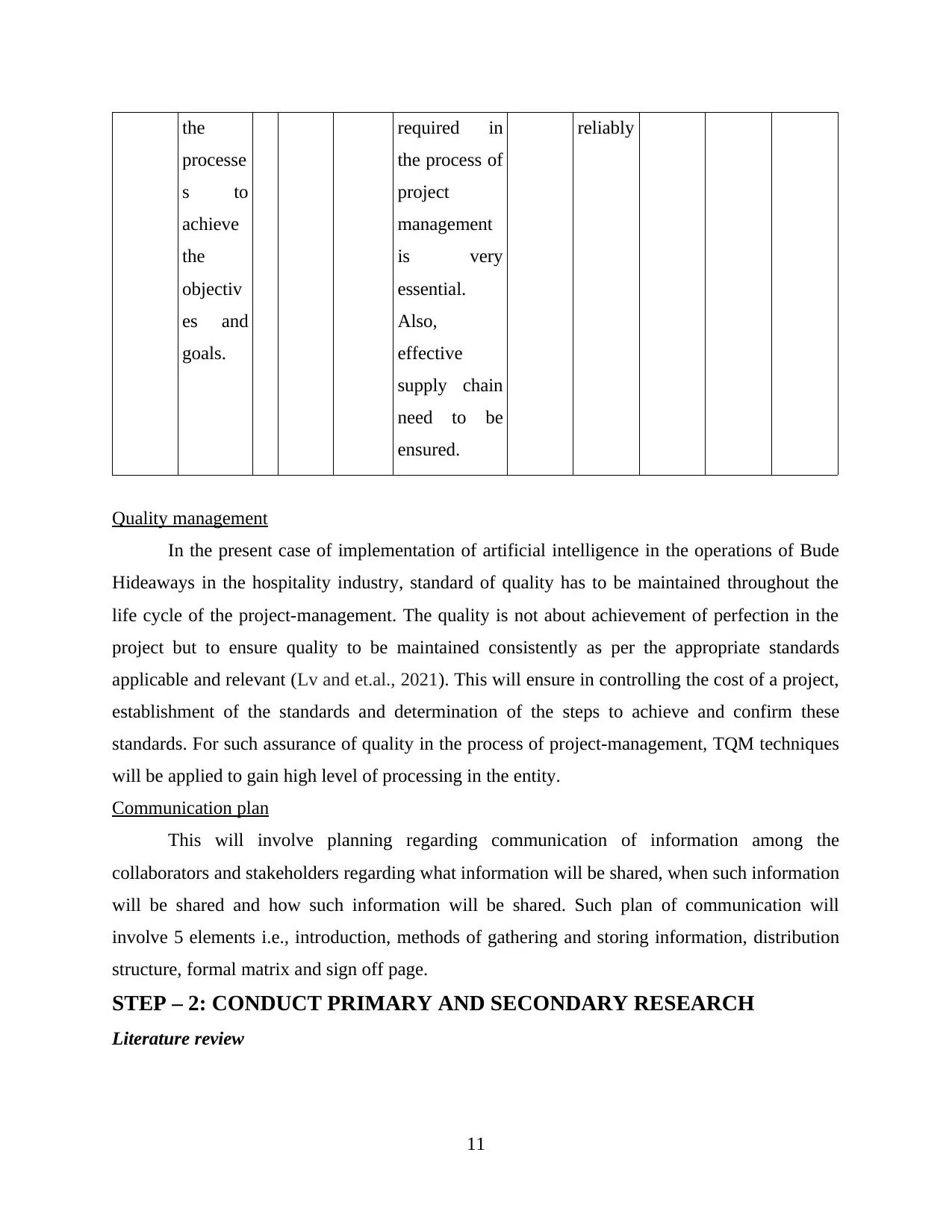
the
processe
s to
achieve
the
objectiv
es and
goals.
required in
the process of
project
management
is very
essential.
Also,
effective
supply chain
need to be
ensured.
reliably
Quality management
In the present case of implementation of artificial intelligence in the operations of Bude
Hideaways in the hospitality industry, standard of quality has to be maintained throughout the
life cycle of the project-management. The quality is not about achievement of perfection in the
project but to ensure quality to be maintained consistently as per the appropriate standards
applicable and relevant (Lv and et.al., 2021). This will ensure in controlling the cost of a project,
establishment of the standards and determination of the steps to achieve and confirm these
standards. For such assurance of quality in the process of project-management, TQM techniques
will be applied to gain high level of processing in the entity.
Communication plan
This will involve planning regarding communication of information among the
collaborators and stakeholders regarding what information will be shared, when such information
will be shared and how such information will be shared. Such plan of communication will
involve 5 elements i.e., introduction, methods of gathering and storing information, distribution
structure, formal matrix and sign off page.
STEP – 2: CONDUCT PRIMARY AND SECONDARY RESEARCH
Literature review
11
processe
s to
achieve
the
objectiv
es and
goals.
required in
the process of
project
management
is very
essential.
Also,
effective
supply chain
need to be
ensured.
reliably
Quality management
In the present case of implementation of artificial intelligence in the operations of Bude
Hideaways in the hospitality industry, standard of quality has to be maintained throughout the
life cycle of the project-management. The quality is not about achievement of perfection in the
project but to ensure quality to be maintained consistently as per the appropriate standards
applicable and relevant (Lv and et.al., 2021). This will ensure in controlling the cost of a project,
establishment of the standards and determination of the steps to achieve and confirm these
standards. For such assurance of quality in the process of project-management, TQM techniques
will be applied to gain high level of processing in the entity.
Communication plan
This will involve planning regarding communication of information among the
collaborators and stakeholders regarding what information will be shared, when such information
will be shared and how such information will be shared. Such plan of communication will
involve 5 elements i.e., introduction, methods of gathering and storing information, distribution
structure, formal matrix and sign off page.
STEP – 2: CONDUCT PRIMARY AND SECONDARY RESEARCH
Literature review
11
⊘ This is a preview!⊘
Do you want full access?
Subscribe today to unlock all pages.

Trusted by 1+ million students worldwide
1 out of 30
Related Documents
Your All-in-One AI-Powered Toolkit for Academic Success.
+13062052269
info@desklib.com
Available 24*7 on WhatsApp / Email
![[object Object]](/_next/static/media/star-bottom.7253800d.svg)
Unlock your academic potential
Copyright © 2020–2025 A2Z Services. All Rights Reserved. Developed and managed by ZUCOL.




